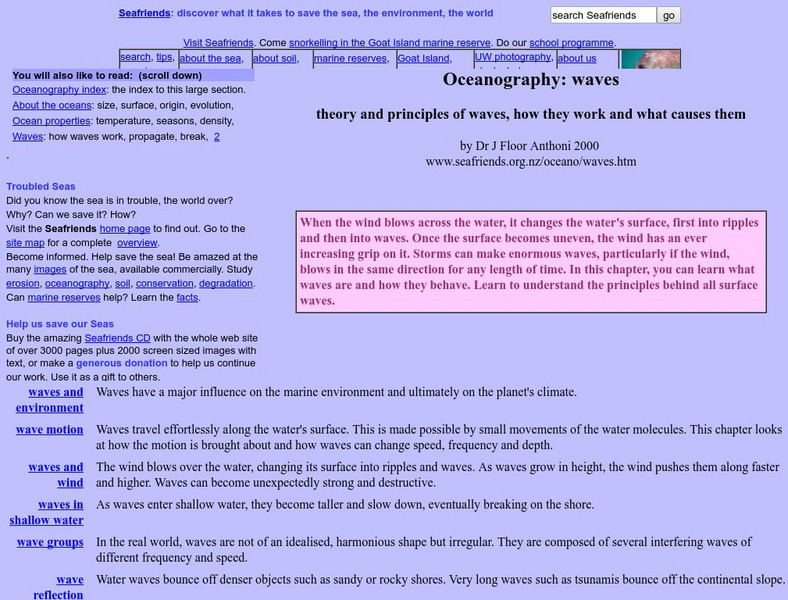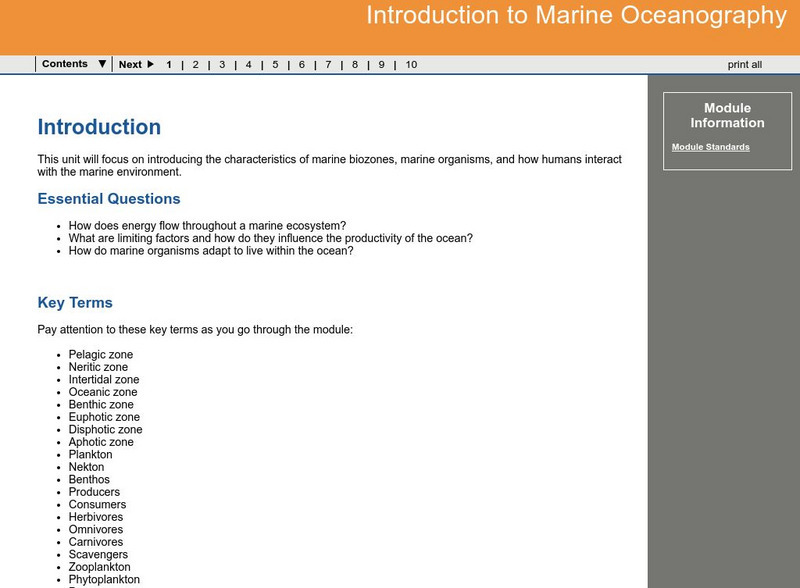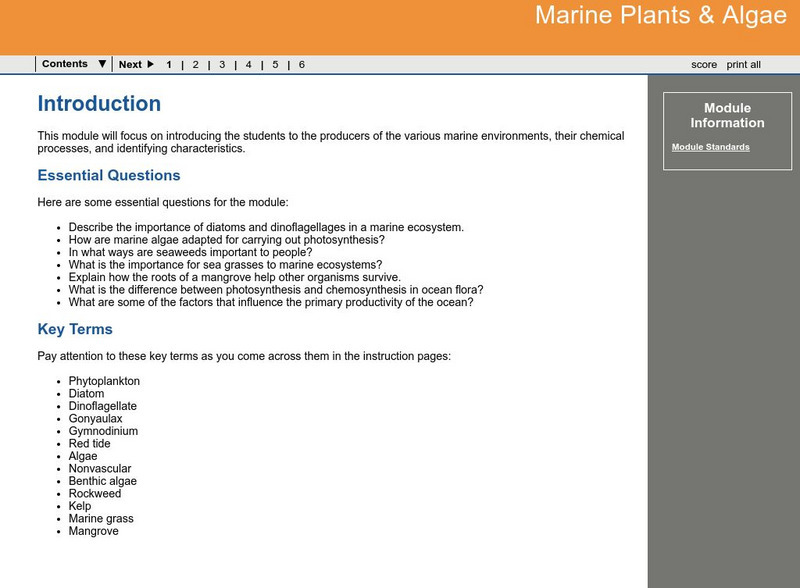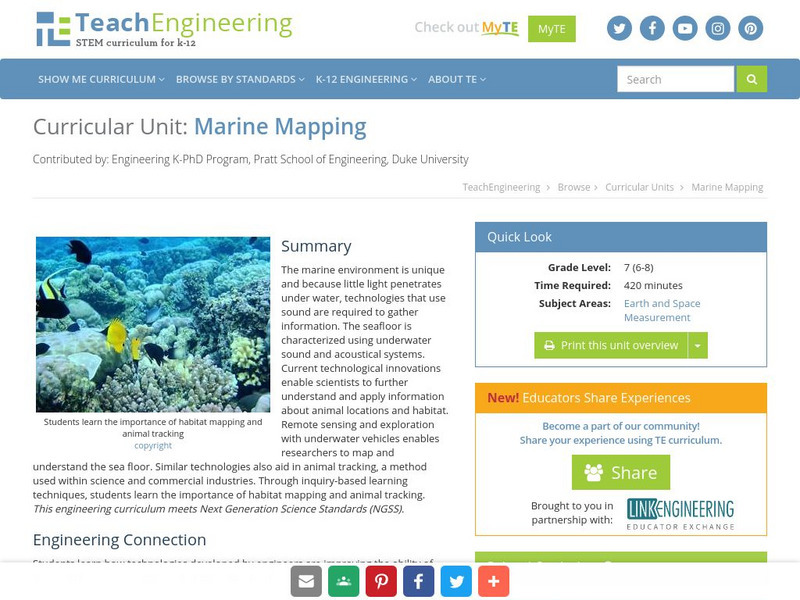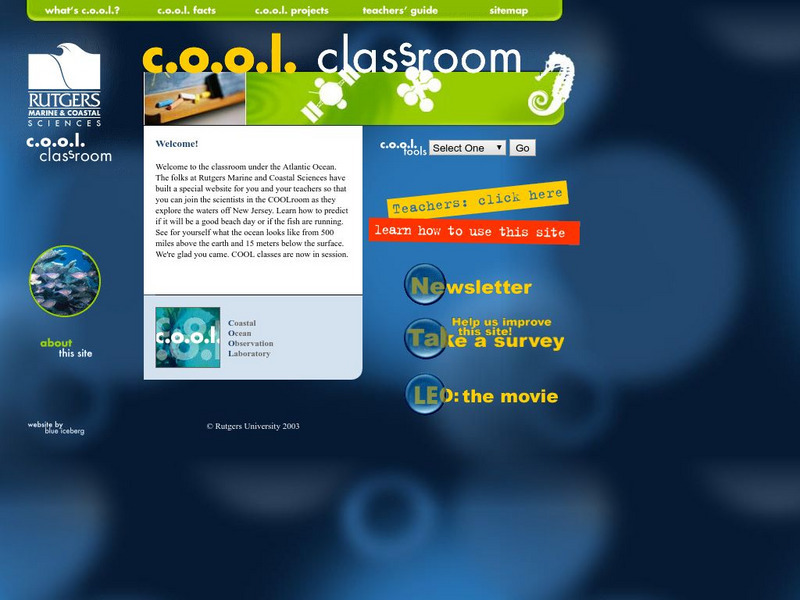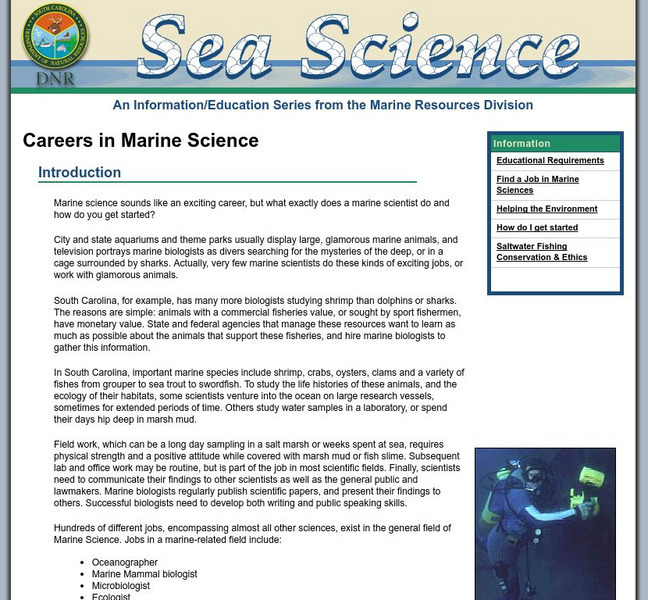Hi, what do you want to do?
Other
Seafriends Marine Conservation and Education Centre: Oceanography: Waves
A very detailed article on the characteristics of waves and wave behavior. It discusses the influence waves have on the marine environment and the global climate, the physics of wave motion, the interactions between waves and wind, wave...
Georgia Department of Education
Ga Virtual Learning: Introduction to Marine Oceanography
Students learn about marine biozones, marine organisms, and how humans interact with the marine environment.
Georgia Department of Education
Ga Virtual Learning: Marine Plants & Algae
Students are introduced to the producers of the various marine environments, their chemical processes, and identifying characteristics.
TeachEngineering
Teach Engineering: Marine Mapping
The marine environment is unique and requires technologies that can use sound to gather information since there is little light underwater. The seafloor is characterized using underwater sound and acoustical systems. Current...
Smithsonian Institution
Smithsonian Institution: Marine Science at the Smithsonian Institution
A site for networking many institutions, laboratories, and research groups working in the field of marine science. Has links to many scientists and their research interests.
University of Maryland
Coastal & Marine Environments: Transgressions & Regressions
These are lecture notes for a course in historical geology. They look at different types of coastlines where marine and terrestrial environments interact and the geological characteristics of each, followed by a discussion of...
Smithsonian Institution
Smithsonian Learning Lab: Contrasts in Blue: Life on the Caribbean Coral Reef and the Rocky Coast of Maine
Smithsonian Education presents Contrasts in Blue: Life on the Caribbean Coral Reef and the Rocky Coast of Maine. Teachers can download this comprehensive teaching package in which learners explore two marine ecosystems, the coral reefs...
CK-12 Foundation
Ck 12: Earth Science: Types of Marine Organisms Study Guide
[Free Registration/Login may be required to access all resource tools.] This study guide summarizes key points about the types of organisms found in marine environments. Includes a few questions to check for understanding.
PBS
Nh Pbs: Nature Works: Marine Communities
This informative Natureworks site examines how life in marine communities must be adapted to live and survive under a wide variety of conditions.
Yale University
Yale Environment 360: The Oil Spill's Growing Toll on the Sea Life of the Gulf
Marine biologist Thomas Shirley explains the impact of the Gulf of Mexico oil spill in the short and long term. The total impact is hard to determine at this point of time, however. Shirley gives his best opinion of the damage that...
Other
The Marine Science Institute
The Marine Science Institute offers various general information about the San Francisco bay and its ecology.
Scholastic
Scholastic: Ocean Life
Good starting point for researching ocean life. Find general information, research-topic ideas, a glossary of important terms and people, and numerous links to related sites.
Other
Rutgers Marine & Coastal Sciences: Cool Classroom
Students and teachers can explore the work of marine scientists and observe the ocean from their computers. Learn about Rutgers Coastal Ocean Observation Laboratory, discover why oceanography is important, and see what life is like in...
Other
Itopf: Effects of Marine Oil Spills
Site highlights the serious economic impact on coastal activities and marine life.
Tramline
Tramline, Inc.: Virtual Ocean Field Trip
In this enchanting site, students will learn basic principles about oceans and will be introduced to an assortment of sea life, both plant and animal. Other interesting ocean links can be found on the teacher resource section of this link.
Other
Scdnr: Careers in Marine Science
So you want to be a Marine Scientist? Learn about the Marine Science field and the career planning process.
Georgia Department of Education
Ga Virtual Learning: Coastal Ecosystems
Students are introduced to the various marine environments, their unique formations, origin and identifying characteristics.
NOAA
Noaa: Make an Edible Coral Reef [Pdf]
Read about and view pictures of coral reefs. Then make a cake model of a coral reef and eat your way to a better understanding of life around these marine environments.
Other
Glover's Reef Marine Reserve
This Glover's Reef Marine Reserve site gives information one of Belize's marine reserves. It discusses all aspects of the reserve including why it is necessary and what types of wildlife and plants live there. This site offers links to...
National Center for Ecological Analysis and Synthesis, University of California Santa Barbara
University of California: A Global Map of Human Impacts to Marine Ecosystems
Maps in different categories such as fishing, climate change, and pollution were pulled together into a composite map that shows the impact of humans on the world's oceans. Analysis at the time (2008) showed that 40% of the world's...
Other
North Carolina Dept. Of Environment & Natural Resources: Kids' Educational Pages: Fish
A great site for kids wanting to learn more about fish and have some fun at the same time. It provides information about fish including food chain, fun fish facts, crustaceans, and shellfish: oysters, scallops, and clams. It also...
Science Buddies
Science Buddies: Heavy Metals and Aquatic Environments
You might know that lead can be toxic, and that you can get lead poisoning from eating or inhaling old paint dust. Lead is called a heavy metal, and there are other sources of heavy metals that can be toxic, too. Silver, copper, mercury,...
Other
Australian Government: Dept. Of Agriculture: Environment
Improving stewardship and sustainable management of Australia's environment including topics such as biodiversity, EPBC Act, Marine, Protection, International Activities, and Partnership.
Kidport
Kidport: Life in the Sea
Teachers can utilize this colorful interactive site so that students can explore the wonderful world of sea animals. Use this site to learn their characteristics and living environments.





